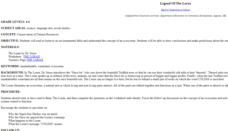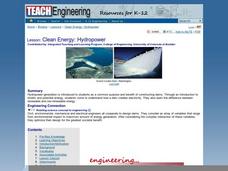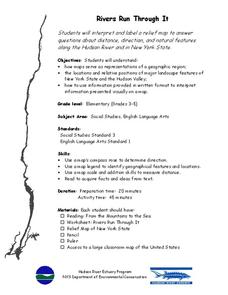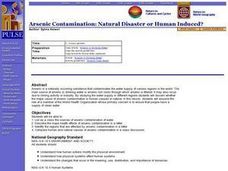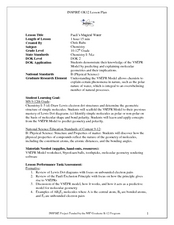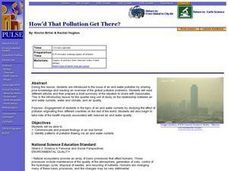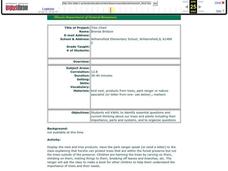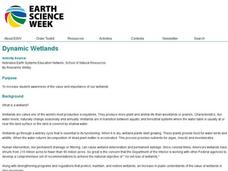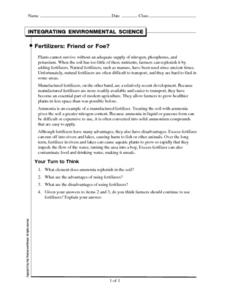Curated OER
Lesson Two: Discover a purpose for keywords
Second graders research a topic in nature. In this research instructional activity, 2nd graders pick a nature topic and discuss the keywords needed to find more information about that topic. They fill their information out on a organizer.
Curated OER
Maintaining Strong Fisheries
Students play a game about the life cycle of a blue crab in order to witness the causes of changes in the crab population and discuss what a resource manager could do to keep a stable crab population. Students then create a game titled...
Curated OER
Energy Resources Scavenger Hunt
In this environment activity, learners complete each of the statements with its correct energy resource. They identify and name various types of plants and rocks. Students also identify and explain how fertilizer works and how it can be...
Curated OER
Nature Superfish
Students examine the billfish as a predator in the ocean. In this ocean, creatures, and tides lesson, students view video clips and discuss the sea creatures and scientists in the videos. Students create their own videos. students...
Curated OER
Forces of Nature: The Challenges of River Travel
Students examine how river travel affected the Lewis and Clark expedition. They define gravity, slope, and velocity, conduct a river formations experiment, complete an activity sheet, and watch a video about Lewis and Clark.
Curated OER
An Introduction to Modern Economics
Practice reading comprehension with this informational economics worksheet. Learners read a 2-page explanation of the beginnings of modern economics and how it plays a role in society. This reading discusses natural, human and capital...
Curated OER
Taking Action
Young scholars use the net they make to dip macroinvertebrates at or below the surface. The flat side of the net allows pressure on the substrate so that organisms do not escape under the net. Two students hold onto the handles and...
Curated OER
Legend of The Lorax
Students explore ecosystems. They read or listen to Dr. Seuss' The Lorax to draw conclusions and make predictions about the environmental impact and use of resources. They write poems about real forests and the wildlife which inhabit...
Curated OER
Clean Energy: Hydro-power
Students read about and discuss renewable and non renewable energy and identify how a dam produced energy using hydro-power. In this water energy lesson plan, students look at diagrams and pictures of water energy technology.
Curated OER
Rivers Run Through It
Using a relief map of New York State, learners answer questions about the distance between different cities, identify bodies of water, and more. First, they discuss vocabulary related to the Hudson River area. Then, they complete a...
Curated OER
Arsenic Contamination: Natural Disaster or Human Induced?
Students list as a class the sources of arsenic contamination of water. They describe the major health effects of arsenic contamination in a letter. Students identify the regions that are affected by it.
Curated OER
Pauli's Magical Water
Learners predict the shape of molecules using VSEPR theory. In this chemistry lesson, students differentiate a polar and nonpolar molecule. They discuss why water's polarity is very important.
Curated OER
Wasting Water
Middle schoolers participate in a hands-on experiment to discover why it is important to conserve water and explore common ways water is wasted. Students estimate the volume of water available on earth and calculate the volumes and costs...
Curated OER
Environment: How'd That Pollution Get There?
Students examine how global wind and water patterns aid in the spread of worldwide pollution. In groups, they read articles about the domino effect of pollution and create posters displaying its journey. On blank world maps, students...
Curated OER
Tree Chart
students identify questions about trees and plants to include their importance, parts, and systems. They list the things they know, want to know, and how they are going to study it.
Curated OER
Dynamic Wetlands
Learners construct and observe a model of two different types of wetlands. In this wetlands lesson, students create a model of a wetland with constant drainage and a wetland that maintains a well-saturated soil. Learners observe and...
Curated OER
Exploring for Petroleum - Modeling an Oil Reserve
Students experiment with locating oil reserves. In this conservation lesson, students use a cardboard box to create sand, rocks, and an oil reserve (water balloon). They use a probe to dig around in the box to find the oil reserve and...
Curated OER
Modeling an Oil Reserve
Students conduct an experiment. For this oil and natural gas lesson, students learn how geoscientists identify and explore reserves of petroleum. Students make a model of an oil reserve, record how much it would cost to drill for oil...
Curated OER
Fertilizers: Friend or Foe?
In this fertilizer worksheet, students read about natural and manufactured fertilizers. They answer four critical thinking questions about fertilizers and their use.
Curated OER
Weathering and Erosion
Students conduct two experiments. In this weathering and erosion instructional activity, students identify the different ways that weathering occurs, name the natural elements of weather and explain the process of erosion. Students watch...
Curated OER
Acid Mine Drainage
Learners use cabbage, backing soda, cobblestones, and more to test the acid in the water. In this acid mine damage lesson plan, students complete 13 experiments to test and treat acid.
Curated OER
Kalahari Explorations
Students research the area of the Kalahari Desert. They use the online and print resources and evaluate the information they find. They present their information to the class.
DiscoverE
Paper Recycling
Paper is made from paper, right? Future scientists take bits of paper and produce sheets of recycled paper. The only drawback? It has to dry overnight.
Curated OER
Break the Tension
Students experiment with the concepts of surface tension. They participate in a number of different experiments that introduce them to surface tension. They work in a small group in order to conduct these experiments.









